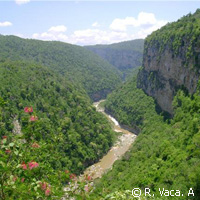Green scientists shed light on cost-effective ecological restoration approaches
Ecological restoration can curb environmental degradation but little is known about how cost effective the approaches are. Enter an EU-funded team of scientists from the UK and Latin America that investigated the cost-effectiveness of renewing a degraded, or even destroyed, ecosystem through human intervention. The study's findings are published in the journal Proceedings of the National Academy of Sciences (PNAS). The results are an outcome of the REFORLAN ('Restoration of forest landscapes for biodiversity conservation and rural development in the drylands of Latin America') project, which clinched more than EUR 1.7 million through the 'International cooperation activities' budget line of the EU's Sixth Framework Programme (FP6). REFORLAN identified and promoted approaches for the sustainable management of dryland forest ecosystems. Countries worldwide are introducing varied, yet costly, approaches to restore ecosystems to their former glory. Despite these formidable efforts, information is lacking about whether the investments being made offer more benefits than financial headaches. Where environmental degradation triggers the most problems is in arid and semi-arid areas that in fact cover almost a third of our planet's land surface, and comprise 50% of the surface area of the world's developing countries. In their study, the experts found that while these areas are dry they play a huge role in Earth's biodiversity. For instance, varied crops and unique species first emerged in these areas. It should be noted that farmers living in these areas also depend on forest resources to support their livelihoods. But overharvesting, unsustainable land use practices, as well as the expansion of rangeland for livestock and urban settlements have severely affected these critical areas. This degradation has had a huge impact on soil fertility, water availability, the livelihoods of local folk, and biodiversity in general. The scientists mapped the value of various benefits provided by these forests. 'Values were analysed through interviews with local people and other stakeholders and by reference to the scientific literature,' explained Jenny Birch from the Centre for Conservation Ecology and Environmental Change at Bournemouth University in the UK, and lead author of the study. 'Research focused on valuing the benefits provided by forests to people, including carbon sequestration, timber, non-timber products (such as medicines and honey), and tourism. The costs of forest restoration were also estimated, including the loss of livestock production, cost of fencing, fire suppression and tree establishment.' The team assessed three restoration approaches and compared them using a simulation model of forest landscapes. They found that ecological restoration of dry forests could be cost-effective with the implementation of 'passive' approaches, as they support the natural process of forest recovery. 'Active' approaches, such as tree planting, may not as effective because they could incur other expenses. Nevertheless, some areas assessed in the study would in fact benefit from active restoration approaches. 'Results show that passive restoration is cost-effective for all study areas on the basis of the services analysed, whereas the benefits from active restoration are generally outweighed by the relatively high costs involved,' the authors write in their paper. 'These findings were found to be relatively insensitive to discount rate but were sensitive to the market value of carbon.' Commenting on the study's potential impact, Bournemouth's Professor Adrian Newton said: 'At the recent meeting of the Convention of Biological Diversity in Nagoya, Japan, countries of the world committed to a new target to restore 15% of degraded ecosystems worldwide by 2020. Our research demonstrates that in dryland areas, where it is most needed, investment in ecological restoration can provide a net increase in the value of ecosystems to people. Hopefully, our research will encourage decision-makers to support restoration efforts, so that the global restoration target is achieved.' Researchers from Argentina, Chile and Mexico contributed to the study.
Countries
Argentina, Chile, Mexico, United Kingdom



